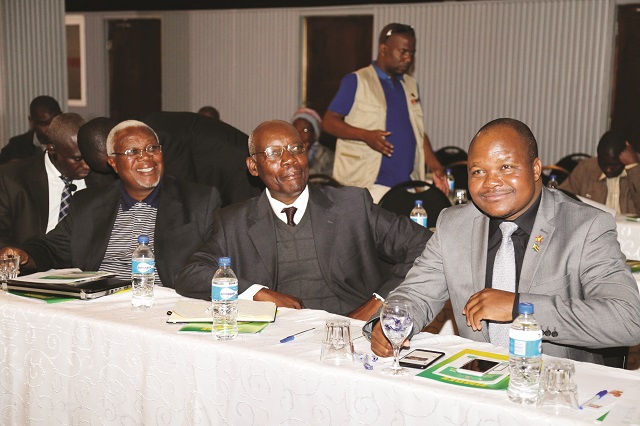Sadc commends Zim, adopts STEM


From right, High and Tertiary Education, Science and Technology Development Deputy Minister Dr Godfrey Gandawa, acting National University of Science and technology (Nust) vice chancellor Professor Samson Sibanda and Gwanda University college of Nust acting Dean Faculty of engineering Dr Abraham Nyoni follow proceedings during a business luncheon held at Bulawayo hotel on Monday
Auxilia Katongomara, Chronicle Reporter
SADC countries have adopted the Science, Technology, Engineering and Mathematics (STEM) initiative which will see pupils undertaking it from Early Childhood Learning to tertiary level.
The regional bloc commended Zimbabwe for taking a lead in the STEM drive which is a global phenomenon to push the science and technology agenda.
Officiating at a business luncheon on the Role of STEM and universities in Industrialisation and Modernisation in Bulawayo on Monday, Higher and Tertiary Education, Science and Technology Development Deputy Minister, Dr Godfrey Gandawa, said all 14 member states had agreed to adopt STEM at all levels of education.
He said the resolution was made at the Council of Sadc ministers responsible for Education and Training, Science, Technology and Innovation held from June 19 to June 24 in Ezulwini, Swaziland, which he attended.
“The Sadc council of ministers adopted a decision to “develop and implement relevant skills programmes for industrial development, including technical and vocational education and training (TVET), science technology engineering and mathematics (STEM) entrepreneurship, innovation, green education or kills at all levels of education from ECD to university in collaboration with other sectors in the implementation of the Sadc industrialisation strategy and Action Plan,” said Dr Gandawa.
He said the Sadc ministers commended Zimbabwe for taking a leading role in promoting STEM.
“As a ministry we are excited that we are moving in the right direction given the adaptation and endorsement of STEM by our counterparts in the region.
“All the 14 members noted and commended Zimbabwe for leading the domestication of STEM for modernisation and industrialisation,” Dr Gandawa said.
Turning to Monday’s event, the deputy minister said as his Ministry institutes a national skills audit, institutions of higher learning must also carry out studies on the skills required for industrialisation.
“Institutions must stop training just for the sake of training. The curriculum has to change otherwise we are training for dead industries. We must allow dead industries to rest in peace,” said Dr Gandawa.
“The Ministry of Higher Education has placed value on the modernisation and industrialization of Zimbabwe. We do believe that we are the key stakeholder as the ministry to drive industrialisation and modernisation.
“We must strategically plan, develop, attract, and retain Zimbabwe’s talent pipeline for all its socio-economic and cultural sectors with competencies critical for STEM-driven industrialisation and modernisation towards a digital or knowledge economy.
“In the same vein our universities’ curriculum must transform to stop massification of irrelevant graduates who will not add value to the economy but rather increase the number of unemployed.
“We need to move away from that. We are training what was being trained 20 or 30 years ago. The lecturers are just transferring what they learnt 30 years ago to current students. If we are applying the same thing in industry, it means we continue to invest in dead industries.”
He said there was a need to create opportunities for the development of adequate and relevant upper-end skills for jobs of the future hinged on automation, robotics, artificial intelligence, computation, virtual reality and augmented reality.
@AuxiliaK











Comments